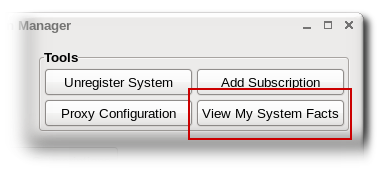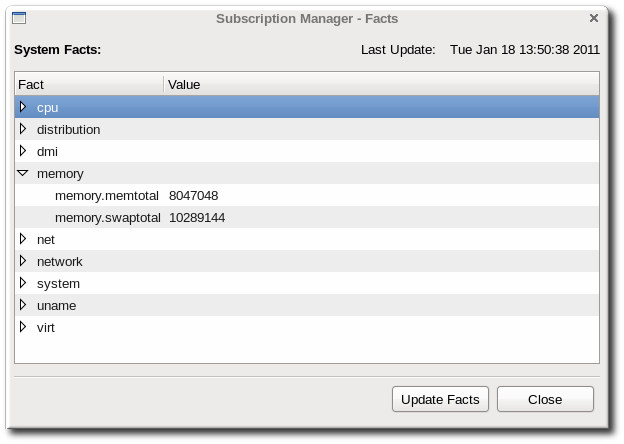Checking and Adding System Facts
Entitlements are available to a system based on whether the software is compatible with the system's architecture. For example, there are different products and subscriptions for 32-bit and 64-bit platforms. CentOS Subscription Manager determines compatibility by collecting a range of facts about the system's hardware and architecture and then comparing it with all available entitlements.
The collected facts can be viewed, updated to acknowledge a hardware or configuration change, or overridden to force compatibility in the specified areas.
The system facts are very similar to the information in /etc/redhat-release or /etc/sysconfig. In both the CentOS Subscription Manager GUI and CLI, the facts are represented as simple attribute: value pairs.
Updating the facts resends the information about the system to the CentOS subscription service so that it can update the list of subscriptions which match the system architecture. Updating the facts is a very good thing to do after hardware upgrades or other important system changes.
To update the facts, click the Update Facts button in the bottom right of the window. To simply list the facts, run the To update the facts after a system change, use the The system facts, as collected, are stored in The primary file is generated and maintained by the Subscription Manager service. However, these values can be overridden to force architecture or platform compatibility (and thereby widening the available compatible subscriptions) by creating additional JSON facts files and dropping them in the Checking Facts from the CentOS Subscription Manager UI
subscription-manager-gui


Checking Facts with subscription-manager
facts with the --list option.
[root@server1 ~]# subscription-manager facts --list
cpu.architecture: i686
cpu.core(s)_per_socket: 4
cpu.cpu(s): 4
cpu.cpu_family: 6
cpu.cpu_mhz: 2000.010
cpu.cpu_op-mode(s): 32-bit, 64-bit
cpu.cpu_socket(s): 1
cpu.l1d_cache: 32K
cpu.l1i_cache: 32K
cpu.l2_cache: 6144K
cpu.model: 23
cpu.stepping: 6
cpu.thread(s)_per_core: 1
cpu.vendor_id: GenuineIntel
cpu.virtualization: VT-x
distribution.id: Santiago
distribution.name: Red Hat Enterprise Linux Workstation
distribution.version: 5
dmi.baseboard.manufacturer: IBM
dmi.baseboard.product_name: Server Blade
... [snip] ...
--update option with the facts command.
[root@server1 ~]# subscription-manager facts --update
Overriding the Default System Facts
/var/lib/rhsm/facts/facts.facts. These facts are stored as attribute: value pairs, in a comma-separated list.
{"fact1": "value1","fact2": "value2"}
/etc/rhsm/facts directory. These JSON files can override existing facts or even add new facts to be used by the subscription service.
Example 14.12. Example Facts Override File
vim /etc/rhsm/facts/my-example.facts
{"uname.machine": "x86","kernel_version": "2.6.32","physical_location": "MTV colo rack 5"}